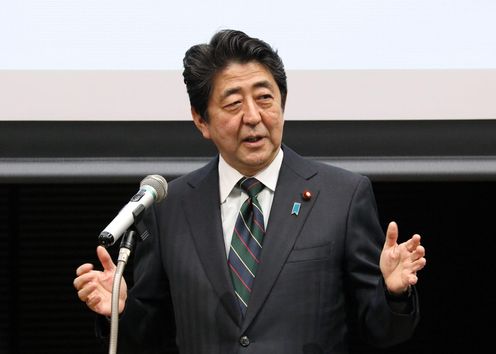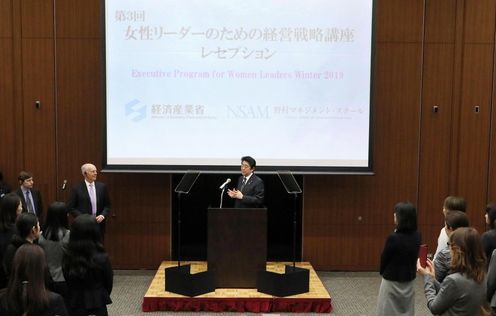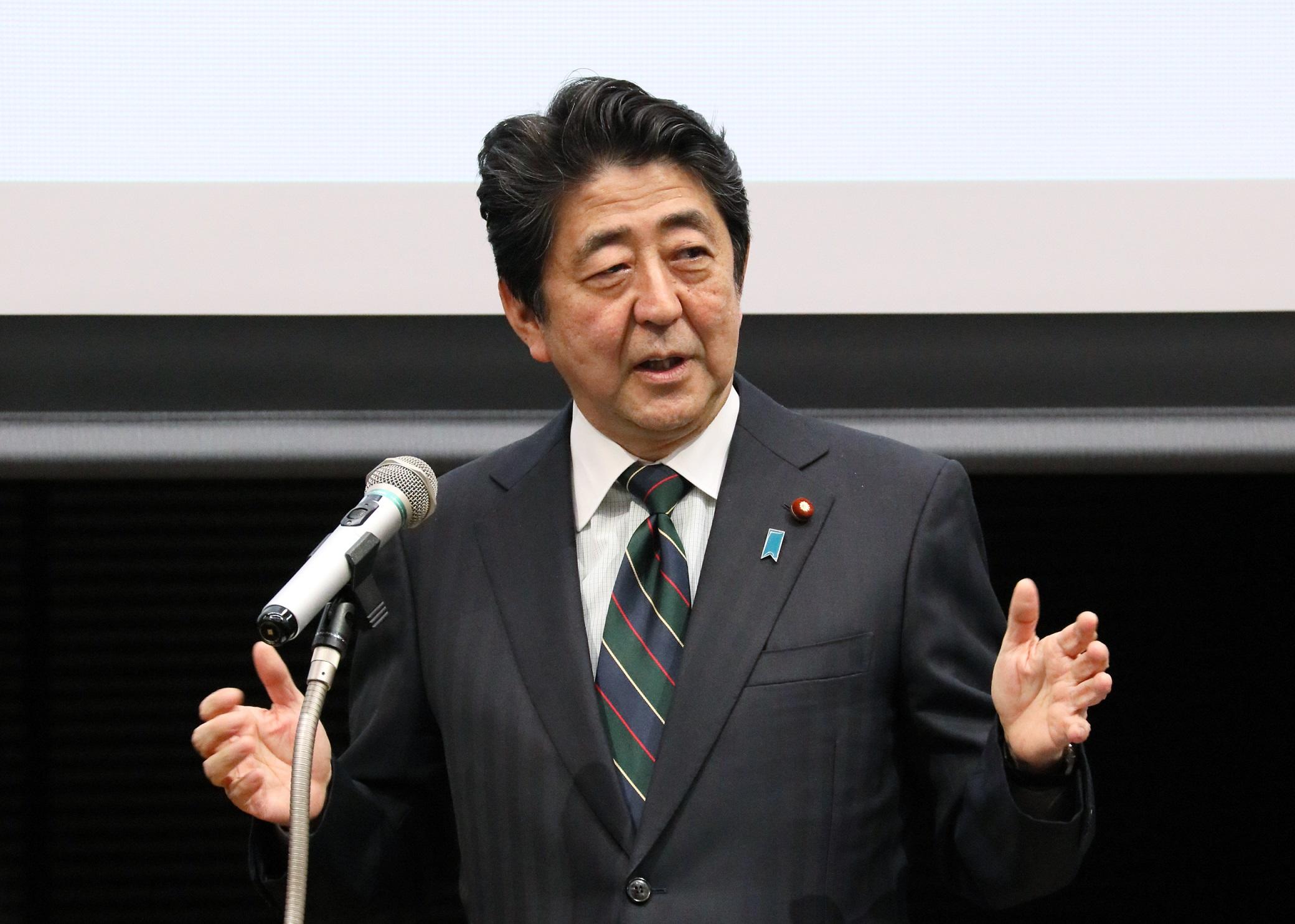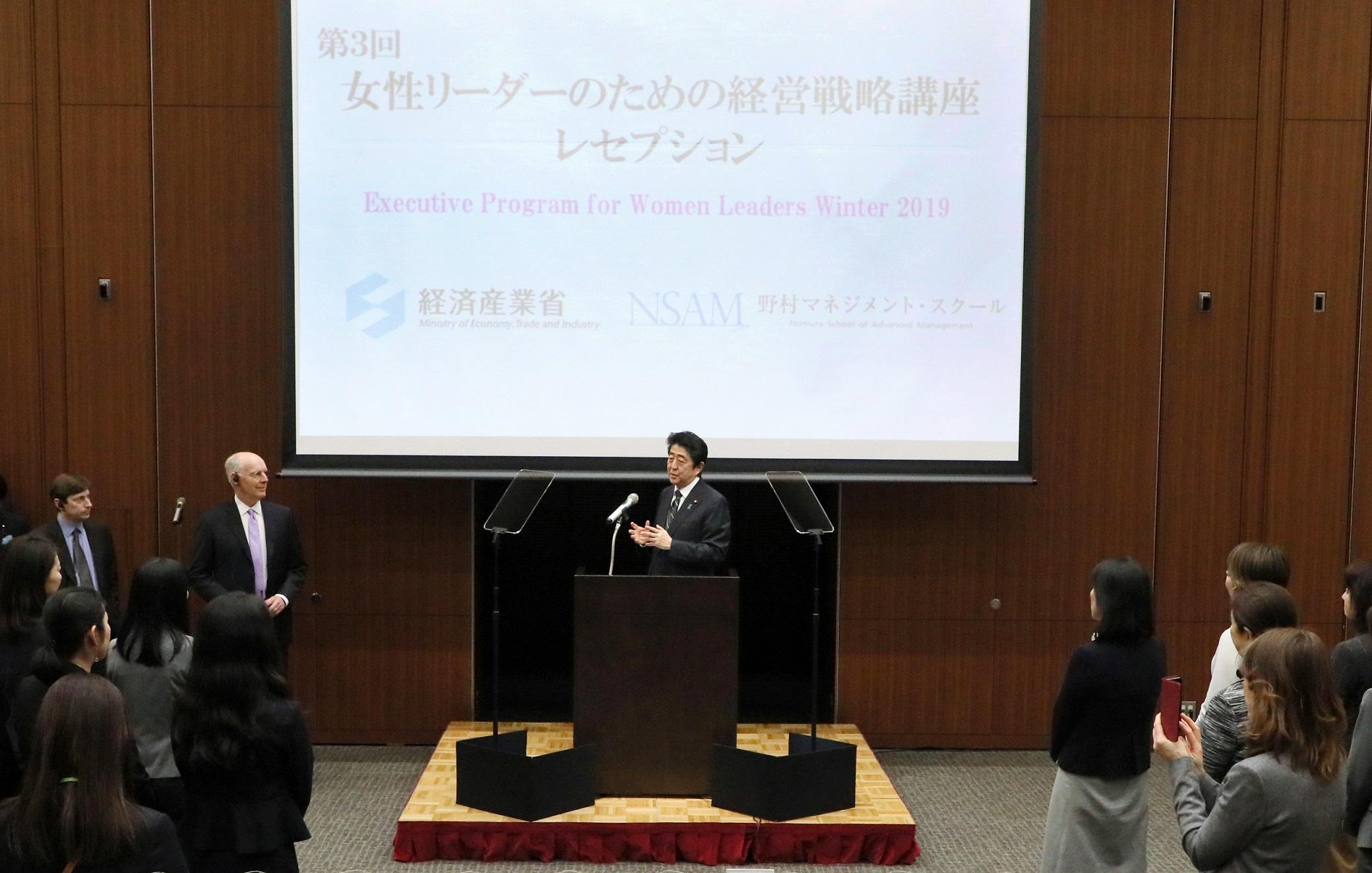Home > News > The Prime Minister in Action > January 2019 > Reception for the Executive Program for Women Leaders
The Prime Minister in Action
Reception for the Executive Program for Women Leaders
January 18, 2019

Photograph of the Prime Minister delivering an address

Photograph of the Prime Minister delivering an address
[Provisional Translation]
On January 18, 2019, Prime Minister Shinzo Abe attended the reception for the Executive Program for Women Leaders Winter 2019 held in Tokyo.
The Prime Minister said in his address,
“This is the third time this program is being offered. Every time, Professors Takeuchi, Badaracco, and Moss come to Japan and give the world’s top-notch lectures. I would like to first thank the three professors.
What I would like to express to you is the evaluation given by the professors: ‘the students are excellent. They are equally competitive, compared with the genuine students of Harvard Business School, in a program of this kind.’ I totally agree with it. Perhaps, I should be telling this to your supervisors, who are in attendance today, rather than you. I would like to ask you to spread the word when you return to your office.
You must build greater confidence in yourself through this weeklong program. I hope that you will seek a career to become an executive officer or become one upon returning to your company. While there are various career options in life, the number of female executives at Japanese companies is still said to be quite low; the number itself has doubled among the listed companies since the inauguration of the Abe administration. I expect that you are already in a position to deal with various difficulties. To start with, you must not back down from such difficulties. I hope that you will keep the positive evaluation you obtained from the professors in mind and tackle these difficulties with confidence.
The most difficult challenge facing Japan is the declining birthrate and aging population that are advancing at an unprecedented pace in the world. Before my administration was inaugurated, laments were heard and there was a wall of hopelessness in Japan that a society with a declining population could not grow. If I may go off topic slightly, my motto is not to give up. It was the lesson I learned from the first Abe administration that ended after a year.”
“We embarked against this wall of hopelessness without giving up. We approached this wall of hopelessness with a set of three arrows. In doing so, the economy grew by more than 10%, and the GDP expanded by 54 trillion yen. Despite the decrease in the working-age population by 4.5 million people, the economy has still grown. We have boldly distributed the benefits of this growth to the working generation, such as childrearing supports.
As a result of establishing childcare facilities for over 500,000 children in five years, the number of children on childcare waiting lists has fallen to below 20,000 children for the first time in ten years—You may not have been aware of that as good news tends not to be reported as news. Even as the working-age population decreased by 4.5 million people, we exerted our efforts to create a good working environment for women, and as a result, the number of working women increased by 2 million women.
The ratio of working women in Japan now exceeds that of the United States in all generations who are 25 years old and older. At the same time, it is also essential that each working person produces as much yield as possible, in other words, increase their productivity, in the limited time available.
This is all the more why it is important that executives responsible for managing the company are selected not only from among a single track of people in the company but from a broad pool of people. It is often said that Lehman Brothers may not have gone bankrupt if it had been Lehman Brothers and Sisters. Perhaps Brooks Brothers might want to change its name.
The number of women executives in Japan is currently fewer than that in the advanced economies of the U.S. and Europe. We need to have many more female executives in order to fulfill diverse needs, and this requires creating a pool of qualified candidates.
While I was told that around 10% of the attendees of this program, as of last year, have been promoted to executive positions, this is still far too few. Last June, we revised the Corporate Governance Code, and now, we request listed companies to appoint women as directors.
We will submit a bill to amend the Act on the Promotion of Women’s Participation and Advancement in the Workplace to the Diet, which will be convened at the end of this month. We will make efforts to ensure that women can fulfill more active roles at a wider range of companies than before.
Japan will undergo a significant change this year. His Majesty the Emperor will abdicate on April 30, and His Imperial Highness the Crown Prince will accede to the Imperial Throne on May 1. Japan will host the G20 Summit as the Chair in June and also hold the Seventh Tokyo International Conference on African Development (TICAD7) in August.
In addition, the Rugby World Cup will be held in Japan and the world’s attention will be focused on our country. Working together with all of you, I intend to make this year one that will carve out Japan’s tomorrow.
I would like to conclude my remarks by expressing my high hopes for your further success. Thank you very much for your attention.”


